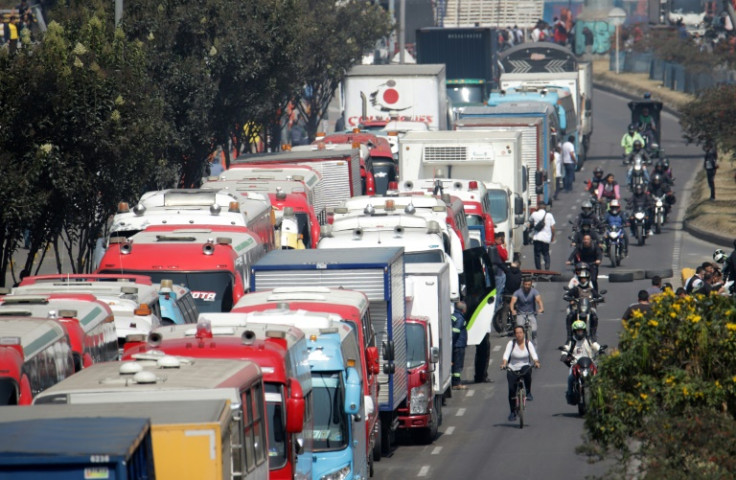
The Colombian government made an "urgent appeal" Wednesday to truckers blockading several highways to create safe corridors for food supplies, amid warnings of looming shortages in several cities.
Hundreds of trucks have been partially or completely blockading roads leading to Bogota and other major cities since Monday in response to an increase in the price of diesel equivalent to $0.46 a gallon (3.8 liters).
"We're issuing an urgent appeal to all the parties involved... to guarantee urgent, unrestricted passage to vehicles transporting food and other essential goods," the agriculture ministry said in a statement.
Warning of "significant" losses for the sector, the ministry called for the creation of "supply corridors" to allow rapid supplies of food and other perishable goods.
Colombia's left-wing President Gustavo Petro is on a drive to gradually scrap subsidies that have kept fuel prices frozen since the Covid-19 pandemic.
A diesel price hike of 20 percent, which came into effect on Saturday, affects the cost of shipping most goods in a country where 90 percent of commodities are transported by road.
The wholesale food markets in Colombia's main cities had received 23 percent fewer goods by volume this week compared to the previous week, the national statistics agency DANE said Wednesday in its daily bulletin.
The volume of deliveries to the Corabastos wholesale market in Bogota, the country's biggest, was down 40.3 percent week-on-week, the agency said.
The government argues that the new price of around $2.70 a gallon still leaves Colombia one of the cheapest countries in the region for diesel.
But farmers in the southern Narino and central Boyaca administrative regions complained Wednesday that they had been forced to give away or dispose of produce they had been unable to get to market.
A second day of talks Wednesday between Petro's government and truckers failed to yield a breakthrough.
"We will not give up until the increase is repealed," president of the Colombian Transporters Confederation, Jorge Garcia, told a press conference.
Petro, the country's first-ever leftist president, has accused "powerful" figures in the business community of being behind the protests and insisted the fuel subsidies were fiscally unsustainable.
Riot police were deployed in several parts of Bogota on Wednesday after transport chaos a day earlier forced many people to walk or cycle to work.
Mayor Carlos Fernando Galan said nearly 1.6 million commuters had been affected and that 67 buses had been vandalized or blockaded by the truckers.
Bus links between the capital and other cities were also affected.




